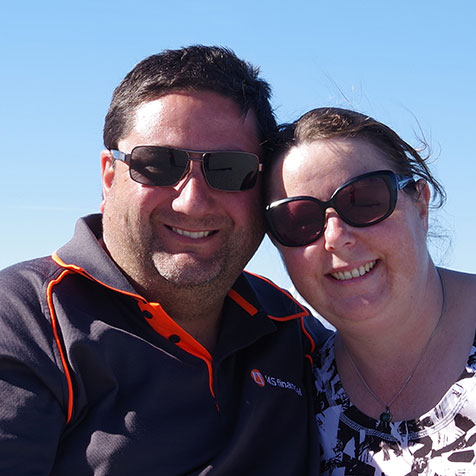Loading component...
At a glance
By Johanna Leggatt
Keith Watson CPA and Rachel Watson CPA swore they would never work together. The Tasmania-based husband and wife had carved out successful careers in separate practices, and that was how it was going to stay.
However, five years ago, one of the partners in Keith’s accountancy practice, 145 Financial, suggested Rachel join the Launceston-based team as a senior accountant.
To make the transition easier, when Rachel joined the business, the pair kept their roles completely separate, with very little overlap in responsibilities.
“We made sure I was not reporting to Keith,” Rachel says, “and it took two years before there was any work crossover whatsoever. I think that really helped to make it work.”
“We didn’t think it would work, as we would be seeing each other all of the time, but it’s worked better than we thought,” Keith admits.
“It’s nice to have someone there to ‘bounce something off’ when you need to.”
Lean on me

While much of Rachel and Keith’s work remains separate, the pair will often turn to each other for a second opinion.
“There are times when tax law is very black and white, but occasionally it’s not, and we find it’s helpful to run interpretations past each other and play devil’s advocate,” Rachel says.
“That brings the best result for the client, because it means we have looked at all the various options.”
When COVID-19 struck in March, the entire 145 Financial team of 18 worked from home for three and a half months. It was then that it really hit home for Rachel and Keith just how valuable their working relationship was.
“There was so much information coming out so quickly [from the federal government] on new financial assistance, and clients would be calling to ask about what assistance they could access,” Rachel says.
“It was good to have someone to talk to.”
It was a similar story for Singapore-based Rachael Lai CPA and Eric Ng CPA, who started their practice, Audit Trust, with just the two of them 10 years ago.
“We knew we were taking a huge step, but we thought we would give it two to three years to see if we could make it, and we have,” Ng says.
"The emotional system is what makes it so successful, and it's also what can destroy it, if not managed properly."
A decade later, there are now 15 staff members in the practice, and the couple has fallen into a comfortable work style.
“We have time together now. When we worked in separate firms, we didn’t see each other until the weekend,” Lai says. “Now, we eat lunch and dinner together.”
Ng says the past decade has solidified both their working and personal relationship.
“We have developed more respect and admiration for each other,” Ng reflects. “We can ask each other about various issues, various interpretations, and it is very helpful.”
A healthy partnership

“Family businesses can be maintained in a healthy or unhealthy way,” notes David Harland FCPA, who is the executive chairman of family business consultancy FINH.
“Businesses merely amplify the ordinary challenges of relationships, and those issues become more obvious.”
What does a healthy family business look like? According to Harland, it involves a recognition of each worker’s capacity and capability, and investment in the development of the individual that is aligned with personal career goals and aspirations, as well as the overarching strategy of the business. To achieve this, spouses need to apply a structure to their business – in the form of employment agreements, meetings with clear agendas, and transparent policies.
Harland notes that meetings about the financial affairs of the business should be separate from ones about investments outside the business. It may be tempting to let the business evolve organically, with few formal processes, but this will harm couples in the long run, Harland says.
“While a business may be working well implicitly for the husband and wife, if you make it explicit and apply a structure to the business, it puts you in good stead when challenges do arrive,” Harland says.
Don’t hesitate to hire an external consultant, either, for advice or even performance reviews, to ensure professionalism and objectivity.
“Most importantly, you should sit down and ask, ‘What are we doing this for, what is our purpose and where are we going?’,” Harland says.
Aim for balance

While Harland recommends instituting proper processes and policies, he notes that there can be drawbacks to an excessively rigid approach.
“You don’t want to treat the family business like an institution would treat their business. Family businesses are different, because they are emotional systems,” he says.
“The emotional system is what makes it so successful, and it’s also what can destroy it, if not managed properly.”
There is a real art to steering a family business, Harland says, and spouses should strive for balance, a happy medium.
“That will look different for each business and for each person within that business,” he says.
For Lai and Ng, this means organising their office within a distinct structure that nevertheless is flexible enough to allow for collaboration.
“We have policies, and we have arranged our staff into teams and portfolios,” Ng says. “So far, it works really well.” The two have distinctly different strengths, which ensures a balance of skills in the management of the business. While Ng and Lai both have their own portfolios, they also discuss technical issues about auditing.
"People in families do want to work together, because when people get it right, there is nothing better."
“Eric is very meticulous and slow, whereas I tend to work faster and want to ensure I get the work done by a deadline,” Lai says.
“He will look at things from a different perspective, and sometimes I will consult his advice and knowledge in certain areas.”
Ng says he admires Lai’s approach.
“Rachael has a real ability to zero in on a goal and achieve a certain outcome by a certain time very efficiently,” he notes.
The couple work hard to guard their time together as a family, to ensure that their business does not bleed excessively into their downtime.
On weekdays, the couple often work longer days, so they can enjoy more time together on the weekends.
“We try not to work on the weekends, as we see that as family time,” Lai says.
“I’ve seen my friends working seven days a week, and they don’t have time for family. I think that is really sad.”
When things go wrong

Of course, things don’t always go to plan.
Some personal relationships sour or end, throwing the family business – and each couple’s livelihood – into jeopardy.
This often brings monumental change.
“Most of the time, couples working in the business are unlikely to want to keep working together,” Harland says.
“But you may see one or both remain as shareholders or investors [if it’s a larger business] and they have a functioning board, and the business is still sustainable.”
The more structures and policies there are in place at the time of the split, the easier the disentanglement will be, Harland says.
“Typically, an independent facilitator can understand the challenges around two people who can no longer communicate effectively,” Harland adds. “They can help remove the emotion.”
Financial considerations are often paramount, but it is also worthwhile thinking about how restructuring a family business following a separation would affect children.
“You don’t want to break that nexus for the next generation, so it’s important to keep the legacy alive through having those structured processes in place from the very beginning,” Harland says.
Legal options
Steven Edward, Australian Family Lawyers’ principal and head of legal – Victoria, says that, when a relationship or a marriage ends, often the wisest thing is for both sides to make a “clean break” between their asset ownership and financial positions, to ensure their agreement is “practical, fair and legally binding”.
“It is very normal, following separation, that one person will remain and operate the business, and the other person is either paid out by a lump sum or in negotiated instalments,” Edward says.
“Or they may receive an adjustment for their share of the value of the business in the division of the non-business assets.”
It is almost unheard of for separated couples to try to continue working together.
“Over the course of my 35 years of legal practice, I actually have not come across a separated couple deciding to run a business together long term,” Edward says.
Occasionally, he sees businesses sold “as a last resort”, although the current challenging economic climate may see this happen more frequently. Or, indeed, businesses may simply be shut down.
“Dealing with the business asset as part of an overall family law property settlement can be either straightforward or complex, corresponding with how straightforward or complex the underlying ownership structure is,” he adds.
Edward recommends spouses obtain specialist accounting and financial planning advice before making decisions on final settlement terms.
He also suggests they factor in long-term tax issues relating to any self-managed superannuation funds (SMSF).
The SMSF issue may resolve “with either both sides retaining their separate beneficiary entitlements in that fund, or a superannuation split and roll-over to another superannuation fund for the person exiting the business”.
CPA Library resource:
It is possible
While occasionally things can go wrong and couples do break up, forcing a radical change of the business ownership structure, this is not to suggest that spouses should not consider taking the plunge of going into business together.
As Harland points out, there is a persistent, old-school way of thinking that family and business should be separate and that people should “never work with their spouse”.
“But that is a simplistic solution to whatever the real issues are,” he says.
“People in families do want to work together, because when people get it right, there is nothing better.”
Being with the one you love and “doing the things you love together” is perhaps one of the most magical experiences in life, he adds.
“A business doesn’t cause the challenges. Usually, it amplifies challenges that were going to be there whether you were in business or not,” he says.
“And the truth is, there have been so many successful stories.”
Indeed. After a decade in business with her husband, Lai would encourage other couples to follow the same path and go into public practice together.
“If you are partners in life and you have the same goal, and you can achieve that goal together, then that is very meaningful,” Lai says.
“Throughout the 10 years, the feeling of achievement and success as a team has been very rewarding.”
Tips for working with your spouse
- Communicate calmly and regularly
- Make sure you have the same goal and a shared purpose
- Learn how to handle conflict and differences
- Separate your work and family life
- Learn how to compromise
Source: Rachael Lai CPA and Eric Ng CPA, Audit Trust

